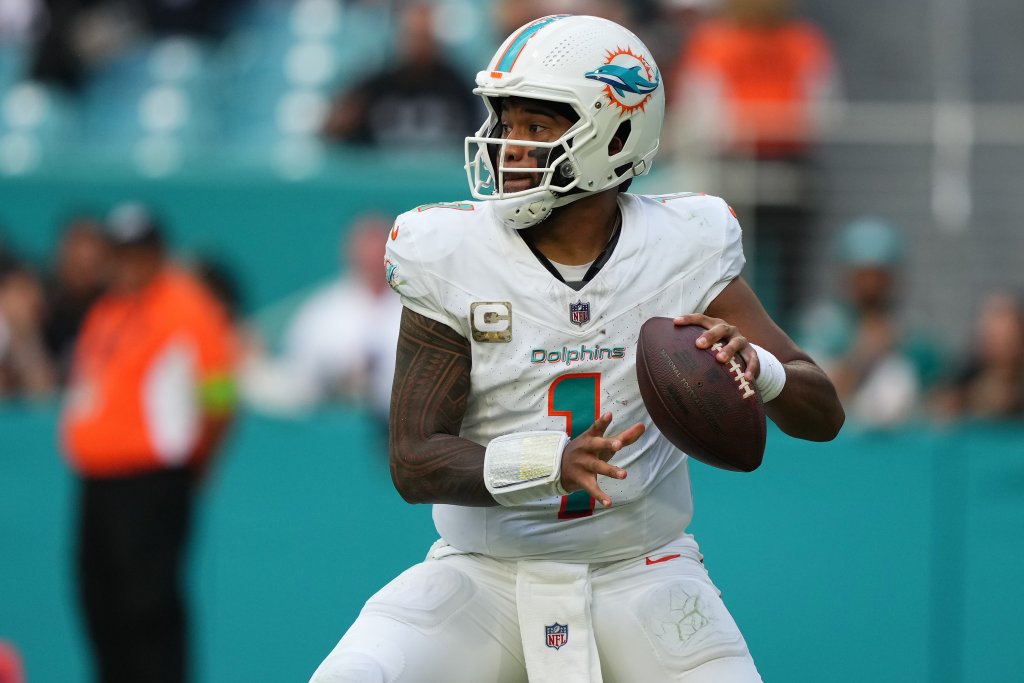West Flagler Challenges Florida Gaming Compact, Sports Betting with U.S. Supreme Court
by Robert Linnehan in Sports Betting News
Updated Feb 8, 2024 · 5:23 PM PST
Nov 19, 2023; Miami Gardens, Florida, USA; Miami Dolphins quarterback Tua Tagovailoa (1) attempts a pass against the Las Vegas Raiders during the second half at Hard Rock Stadium. Mandatory Credit: Jasen Vinlove-USA TODAY SportsWest Flagler Associates today filed its long-awaited writ of certiorari with the Supreme CourtChallenges the Seminole Tribe gaming compact that legalizes online sports betting off tribal landAsks Supreme Court to consider three questions
West Flagler Associates submitted its long-awaited writ of certiorari to the U.S. Supreme Court, asking the court to consider the legality of a gaming compact that legalizes online sports betting off tribal lands.
West Flagler contends the gaming compact between Florida and the Seminole Tribe that authorizes an online sports betting monopoly for the tribe is in violation of the Florida constitution and the Indian Gaming Regulatory Act (IGRA). Florida and the Seminole Tribe approved the 30-year gaming compact in 2021, granting the tribe exclusive retail and online sports betting rights in the state.
The Secretary of the Interior allowed the compact to be approved under IGRA and the D.C. Circuit upheld the approval in 2023.
Now, the Supreme Court will have to determine if it will hear the case or deny the request from West Flagler.
Three Questions of Legality
Hamish Hume, legal counsel for West Flagler Associates, presented three questions for SCOTUS to consider in the writ of certiorari.
Whether IGRA authorizes the approval of a compact that purports to allow for an online sports gambling monopoly throughout the state and off Indian landsWhether an IGRA compact violates the Unlawful Internet Gambling Enforcement Act (UIGEA) if it provides for internet sports betting that is unlawful where many of the bets are placedWhether the Secretary’s approval of a tribal state compact violates equal protection principles where it provides a specific tribe with a monopoly on online sports gaming off tribal lands, while state law makes that conduct a felony for everyone else
These questions, Hume notes, are important not just for the state of Florida, but for the nationwide precedent it will set for other state-tribal compacts if the D.C. Circuit court’s decision is upheld.
“The D.C. Circuit’s decision allows Florida and the Tribe to have their cake and eat it too. The whole point of the Compact is to provide a hook for dodging Florida’s constitutional requirement of a popular referendum to approve off-reservation sports betting. By upholding the approval of the Compact, the Court of Appeals necessarily allowed that fiction to flourish—all while misinterpreting IGRA, the Unlawful Internet Gambling Enforcement Act(UIGEA), and this Court’s equal protection jurisprudence,” he wrote.
Hume argues in the writ that IGRA can not authorize the approval of a gaming compact that allows the tribe to have a monopoly over online sports betting. Nothing in IGRA allows the Secretary of the Interior to approve a compact that provides for gaming off Indian lands, he wrote.
The compact also conflicts with the SCOTUS decision in Michigan v. Bay Mills, which does not allow an “operational linkage between activity on and off Indian land to apply IGRA to gambling activity off Indian lands.” The Circuit Opinion’s decision in this case did the oppose, Hume wrote, concluding that it is permissible for the Secretary to approve a compact that allows for gambling off Indian lands.
Regarding the UIGEA, Hume argued in the writ that Florida law outlaws sports betting from anywhere in the sate that is not on tribal lands, including placing online sports bets in locations off Indian lands, regardless of where the bets are received.
“This unambiguous illegality of online sports betting under Florida state law means that the online sports gaming provisions in the Compact expressly provide for violations of UIGEA,” he wrote.
What’s Next for Florida?
The U.S. Supreme Court will now determine if the writ of certiorari will be accepted and the court will hear the case.
If SCOTUS denies the petition, that would be the end of the road for West Flagler with the court. However, if it decides to accept the petition, a final ruling on Florida online sports betting would likely not come until sometime in late 2025.
Daniel Wallach, a gaming law attorney, Founder of Wallach Legal and UNHLaw Sports Wagering, previously told Sports Betting Dime that SCOTUS typically only hears between 60 to 80 cases a year, but receives many more requests.
West Flagler Associates also has a pending lawsuit against the online sports betting provision in the gaming compact with the Florida Supreme Court.
How Did Florida Get Here?
Florida’s sports betting journey began in 2021 when the state approved a 30-year gaming compact that granted the Seminole Tribe exclusive retail and online sports betting rights in the state. The gaming compact granted the Seminole Tribe exclusive rights to online sports betting through a “hub-and-spoke” system, as well as expanded gaming rights, in exchange for at least $2.5 billion over the first five years. The “hub and spoke” system allowed sports bets to be placed anywhere in the state as long as they were processed by computer servers located on Tribal Land.
The gaming compact also allows casinos to offer craps and roulette.
The gaming compact was thrown out by Friedrich in November 2021. Ultimately, Friedrich determined the compact violated the conditions set forth by IGRA that limits tribal gaming to the confines of tribal lands. The Seminole Tribe argued in the gaming compact that because the servers that processed the online sports bets were located on tribal land, then the bets themselves were placed on tribal lands.
The three-judge panel for the U.S. Court of Appeals for the the District of Columbia disagreed with her ruling. The court vacated the opinion of the district court and ruled in favor of the U.S. Secretary of the Interior Deb Haaland, who initially approved the gaming compact, in June 2023.


